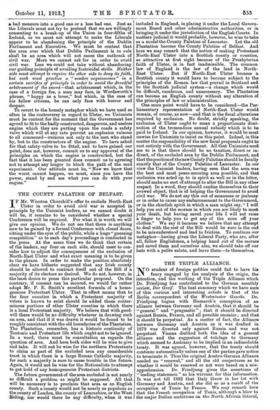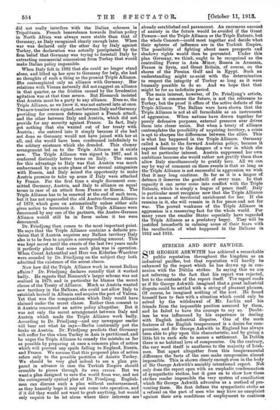THE TRIPLE ALLIANCE.
NO student of foreign politics could fail to have his fancy engaged by the analysis of the origin, the intention, and the working of the Triple Alliance which Dr. Friedjung has contributed to the German monthly review, Der Greif. The best summary which we have seen of this curious and interesting article is that of the Berlin correspondent of the Westminster Gazette. Dr. Friedjung begins with Bismarck's conception of an alliance between Germany and Austria, that it should be " general " and " pragmatic " ; that it should be directed. against Russia, France, and all possible enemies ; and that it should be perpetual. As a matter of fact, the Alliance between Germany and Austria as it was drafted in 1879 was directed only against Russia and was not perpetual. Vienna disliked both the idea of a general alliance and the suggestion of tutelage to Germany which seemed to Andrassy to be implied in an indissoluble treaty. It was agreed, however, that the treaty should continue automatically unless one of the parties gave notice to terminate it. Thus the original Austro-German Alliance needed no " renewal," and all the old conjectures as to whether it would be renewed or not were based on a mis- apprehension. Dr. Friedjung gives the assertions of " leading statesmen " as his warrant for this information. It was not till 1882 that Italy threw in her lot with Germany and Austria, and she did so as a result of the occupation of Tunis by France. We may remark here that the French occupation of Tunis, although a blow to the major Italian ambitions on the North African littoral, did not really interfere with the Italian schemes in Tripolitania. French benevolence towards Italian policy in North Africa was always more stable than that of Germany, as Italy recognized clearly enough later. When war was declared only the other day by Italy against Turkey, the declaration was actually precipitated by the firm belief that Germany was trying to forestall Italy by extracting commercial concessions from Turkey that would make Italian policy impossible.
When Italy felt in 1882 that she could no longer stand alone, and lifted up her eyes to Germany for help, she had no thoughts of such a thing as the present Triple Alliance. She contemplated only an alliance with Germany. Her relations with Vienna naturally did not suggest an alliance in that quarter, as the friction caused by the Irredentist agitation was at that time severe. But Bismarck insisted that Austria must be a party to any alliance. Even so, the Triple Alliance, as we know it, was not entered into at once. Two new treaties were signed, one between Italy and Germany providing for common defence against a French attack, and the other between Italy and Austria, which did not provide for any security against France. In fact, Italy got nothing that she wanted out of her treaty with Austria ; she entered into it simply because if she had not done so Germany would not have joined with her at all, and she would have been condemned indefinitely to the solitary existence which she dreaded. This clumsy arrangement led on to the Triple Alliance as it exists now. The Triple Alliance was signed in 1887, and it conferred distinctly better terms on Italy. The reason for this advantage to Italy was that Austria was much embarrassed by an acute phase of her eternal antagonism with Russia, and Italy seized the opportunity to make Austria promise to take up arms if Italy were attacked by France. For the first time a single document com- mitted Germany, Austria, and Italy to alliance on equal terms in case of an attack from France or Russia. The Triple Alliance has to be renewed at the end of each term, but it has not superseded the old Austro-German Alliance of 1879, which goes on automatically unless either side gives notice to terminate it. If the Triple Alliance were denounced by any one of the partners, the Austro-German Alliance would still be in force unless it too were denounced.
Dr. Friedjung then comes to the most important point. He says that the Triple Alliance contains a definite pro- vision that if Austria acquires any Balkan territory Italy also is to be free to acquire a corresponding amount. This was kept secret until the events of the last two years made it perfectly plain that some such plan was in operation. When Count Aehrenthal and Herr von Kiderlen-Waechter were sounded by Dr. Friedjung on the subject they both admitted the existence of the secret clause.
Now how did the Triple Alliance work in recent Balkan affairs ? Dr. Friedjung declares roundly that it worked badly. He regrets that Bismarck's larger scheme was not realized in 1879, and in particular he blames the secret clause of the Treaty of Alliance. Much as Austria wanted new territory in the Balkans, she could not allow Italy to establish herself in Albania and acquire the port of Valona. Yet that was the compensation which Italy would have claimed under the secret clause. Rather than consent to it Austria renounced an active policy altogether. But it was not only the secret arrangement between Italy and Austria which made the Triple Alliance work badly. According to Dr. Friedjung—and any newspaper reader will bear out what he says—Berlin continually put the brake on Austria. Dr. Friedjung predicts that Germany will suffer for this when Turkey in Asia is partitioned, and he urges the Triple Alliance to remedy the mistake as far as possible by preparing at once a common plan of action which will prevent any spoils falling to England, Russia, and France. We assume that this proposed plan of action refers only to the possible partition of Asiatic Turkey. We should be very glad indeed to see a plan pre- pared in advance in case the Turkish Empire should crumble to pieces through its own errors. But we want a plan designed to save the world from war, and not the outrageously cynical plan of Dr. Friedjung. English. men can discuss such a plan without embarrassment, as they honestly hope it may not come into operation, and if it did they would not want to grab anything, but would only require to be let alone where their interests are already established and paramount. An enormous amount of anxiety in the future would be avoided if the Great Powers—not the Triple Alliance or the Triple Entente, but the whole Concert—could meet together and decide what their spheres of influence are in the Turkish Empire. The possibility of fighting about mere prospects and shadowy rights would then be prevented. Under this plan Germany, we think, ought to be recognized as the controlling Power in Asia Minor, Russia in Armenia, France in Syria, and Great Britain, of course, on the shores of the Persian Gulf and in Egypt. Such an understanding might co-exist with the determination to respect the integrity of Turkey so long as it were humanly possible to do so. And we hope that that might be for an indefinite period. The main interest, however, of Dr. Friedjung's article, so far as it concerns the future, is not the reference to Turkey, but the proof it offers of the active defects of the Triple Alliance. The Balkan wars have shown that the Triple Alliance is not at all formidable as an instrument of aggression. When nations have drawn together for purely defensive purposes, external pressure ever drives them into closer union. But when a treaty of alliance contemplates the possibility of acquiring territory, a crisis is apt to sharpen the differences between the allies. This is what has happened in the Triple Alliance. Germany called a halt to the forward Austrian policy, because it exposed Germany to the dangers of a war in which she had no particular interest. Austria suppressed her own ambitions because she would rather not gratify them than allow Italy simultaneously to gratify hers. All we can say by way of comment on these events is that so long as the Triple Alliance is not successful in aggression we wish that it may long continue. So far as it is a league of defence it deserves the goodwill of every man. In that capacity it can never come into conflict with the Triple Entente, which is simply a league of peace itself. Italy in particular must recognize now that the Triple Alliance is not a means of territorial enrichment for her. If she remains in it, she will remain in it for peace and not for war. The proved weakness of the Triple Alliance in aggression is a reassuring fact for the whole world. For many years the smaller States especially have regarded the Triple Alliance as a predatory bogey. They will be justified henceforth in calming some of their fears with the recollection of what happened in the Balkans in 1912 and 1913.















































 Previous page
Previous page